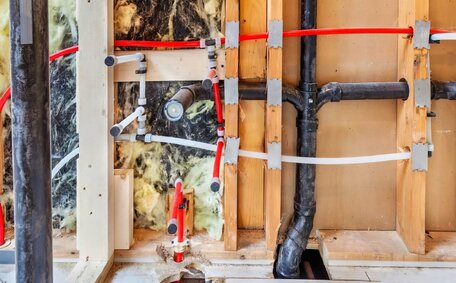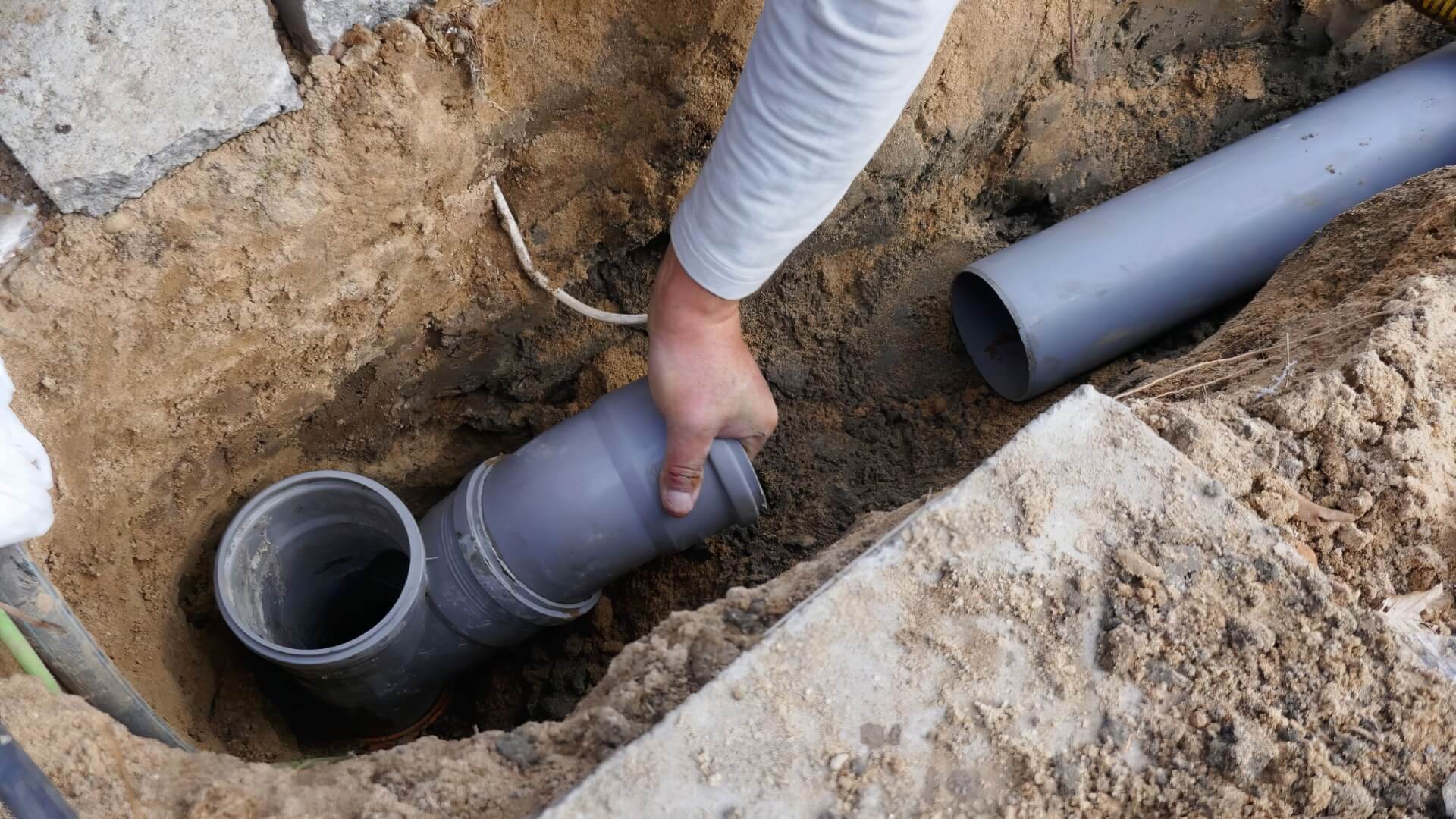Understanding chemical drain cleaners and how they work
Liquid drain cleaners may address blockages and aim to maintain clear pipes, but their usage is fraught with risks. There are three main types of chemical drain cleaners:
- Acidic cleaners use ingredients like muriatic acid (hydrochloric acid) to eat away clogs
- Oxidising cleaners contain potent oxidants like bleach or potassium permanganate that engage with the clog to break up the stubborn material
- Caustic cleaners employ compounds like lye caustic soda (sodium hydroxide) that target and dissolve organic material causing clogs
Opting for chemical drain solutions often leads to the breakdown of materials like hair, food, grease, and soap scum, ironically contributing to further clogs. Misusing drain cleaners can pose significant dangers to your plumbing system, increasing the risk of creating blockages over time.
Chemical solutions, due to their formulation, can permeate standing water and target obstructions—even tree root intrusions—with potent effectiveness.
Health and safety hazards of chemical drain cleaners
Opting for professional drain cleaning services circumvents the dangers of chemical drain cleaners, mitigating notable health and safety risks. Such corrosive chemicals can inflict burns on the skin, harm eyes, cause respiratory damage or even death if mishandled.
The most dangerous ingredients found in drain cleaners are:
- Sulfuric acid - causes severe burns
- Lye (caustic soda) - an extremely corrosive substance that presents risks to both skin and eyes
- Bleach - irritates eyes, skin and lungs
When using chemical drain cleaners, wearing protective gear like rubber gloves, goggles, and a mask is crucial.
It’s vital to ensure proper ventilation and to refrain from combining chemical solutions or using more drain cleaner than the manufacturer’s recommended amount. Ensure that children and pets, along with all individuals, maintain a safe distance from the area where the chemical solution is applied.
If accidentally exposed to a drain cleaner product, immediately get in touch with poison control by calling the Poison Help Line. If skin contact occurs, immediately rinse the affected area with water for 15-20 minutes.
Regular use of these chemical solutions can directly damage your plumbing, progressively compromising pipe integrity. The harsh substances persist, eroding the inner walls and can do untold damage, making them prone to ruptures or collapses. This practice could end up resulting in more substantial repairs down your plumbing track in the long run, becoming a financial burden.
Environmental impact of chemical drain cleaners
The improper use and disposal of chemical drain cleaners can drastically affect your home environment and exacerbate clog formation. When these concoctions find their way down drains, they pollute water sources and soil, whisking away your local ecosystem’s well-being.
Chemicals like sulfuric acid, sodium hydroxide, and bleach enter our sewage systems much like commercial drain cleaners, but with damaging impacts. These substances change the water’s pH balance, making it unsafe for humans, pets, wildlife, and vegetation. These chemicals likewise obliterate microbes critical for processing waste in your septic system, rendering it inefficient.
Some of the concerning environmental effects include:
When it comes to maintenance, many municipalities prohibit or restrict the use of chemical drain cleaning solutions, safeguarding your drain system for these reasons. When flushing remains down the drain, the products continue their chemical reaction, releasing harmful gases. Ventilation is limited, allowing gases to concentrate in sewers and endanger workers.
For drain cleaner use that is safe for plumbing systems and the environment, eco-friendly practices are essential. Enzymatic options, mechanical augers, or hydro jetting conducted by experts are forms of drain cleaner methods that can used and are considered safe for both the water system and the environment.
Chemical drain cleaners can damage pipes
The chemical composition of these cleaners can severely damage plumbing systems, particularly older pipes, with repeated use. Drain cleaners do, through their caustic ingredients, slowly deteriorate materials such as PVC pipes, copper, cast iron, and older steel pipes, making them weaker over time.
Chemical drain cleaners not only dissolve clogs but also react with the pipe’s inner walls, leading to potential damage. Substances such as sulfuric acid, sodium hydroxide, and bleach contribute to the corrosion and weakening of your drainage system. With repeated exposure, pipes develop pinholes, cracks, erosion and pitting.
This creeping deterioration can result in leaks, risking water damage to out your home’s structure, possibly leading to ruptured or collapsed infrastructure. The repairs needed to fix corroded plumbing can cost thousands of dollars. Replacing an entire corroded drain or sewer line is extremely expensive.
Excessive dependence on chemical solutions for clearing clogs can hasten pipe deterioration and result in significant blockages. But even occasional use of chemical drain cleaners slowly takes a toll on pipes over months and years.
To avoid the potential hazards of chemical-based drain cleaners, invest effort in practical drain maintenance measures. Use hair catchers, avoid pouring fats/oils down sinks, and flush pipes regularly with hot water. For stubborn blockages, enlist a professional plumber who can provide safe and effective cleaning solutions with minimal risk to your plumbing.
Safer natural alternatives for clearing clogs
Several non-toxic, natural drain cleaning methods effectively bypass the risks associated with chemical drain cleaners. Safer natural alternatives to try before resorting to harsh chemical cleaners include:
Baking Soda and Vinegar
When it comes to clearing drains naturally, non-chemical cleaning products like a baking soda vinegar mix can be highly effective; their interacting properties work well together as the alkalinity of baking soda complements the acidity of vinegar. Administer the vinegar and baking soda mixture into the drain to let the bubbly reaction gently shift any buildup. Let the mixture let sit for 5-10 minutes then rinse with a pot of boiling water.
A blend of half a cup of baking soda and a cup of warm white vinegar can create a reaction that dissolves organic matter in your pipes.
Boiling Water
Boiling water is particularly adept at melting grease buildups that cause stubborn clogs when poured down the drain. Carefully pour boiling water down drain, permitting it to permeate the blockage before allowing it to settle, followed by a cold water flush to ensure contents can flow freely and cleanse the pipes fully. Avoid splashing as you pour hot water into the drain and repeat the process if needed.
Plunger
Forceful plunging, a proven method, dislodges clogs through suction and pressure, sending them through drain passages. Ensure the plunger forms an airtight seal over the drain to maximise effectiveness. Cover overflow holes and repeat plunging motions several times to unclog fully.
Drain Snake/Auger
Manoeuvring drain snakes, also known as plumbers’ snakes, into your plumbing can effectively remove clogs with precision. Crank the handle once hooked to unclog drains. Seek professional help for inaccessible clogs.
Carefully insert the end of the snake into the drain and twist/push it further until reaching where clogs can form the blockage.
Addressing drain clogs early through regular maintenance avoids serious blockages and the need for hazardous chemical cleaners. Call a professional drain specialist immediately if natural cleaning methods fail in clearing clogged drains with particularly tenacious blockages.
When to call a professional plumber
Dealing with severe or complex drain clogs and pipe issues is often best left to professional plumbers who have the skills, experience and equipment to address them safely and effectively.
Circumstances when you should contact professionals like the team at Penrith Plumbing include:
- Significant drain backups that home remedies cannot resolve
- Complete drain blockages - no water drains at all
- Foul sewage odours coming from drains
- Multiple drains in the home clogged at once
- Previous use of chemical drain cleaners produced no results
- Water pooling around cleanout or along exterior of foundation
- Plumbing leaks, pipe bursts or water damage
- Issues with sewer line, septic tank, or main sewer line
- Issues located behind walls or beneath floors
- Drain line snaking required longer than 50 feet
Penrith Plumbing’s licensed professionals use state-of-the-art cable machines and water jetting equipment to clear your drains safely, ensuring your health, home safety, and environmental protection.
Reach out to Penrith Plumbing to discover more about our comprehensive drain cleaning and plumbing services:
Phone: 1300 349 338
Email: [email protected]
Best practices for maintaining drains without harsh chemicals
Consistent maintenance and proactive care can help maintain clear drains, thus reducing the need for abrasive chemical cleaners. Small in-the-moment actions like straining sink contents and properly disposing of household waste all help contribute to the long-term health of your plumbing.
Many people follow these best practices for maintaining clear drains without chemicals:
- Install mesh screens or drain catchers over all drains to get rid of hair and debris before it enters pipes
- Scrape excess solid food waste into the trash rather than the garbage disposal
- Collect grease or oil in a container for disposal, rather than pouring it down the drain
- Limit garbage disposal use to prevent the build-up of food particles in pipes
- Allow hot tap water to run for a few minutes at least once a week to naturally help loosen and rinse away buildup
- Monthly, pour half a cup of baking soda followed by one cup of vinegar down the drain to prevent soap scum build-up
- Never forcefully plunge or snake your drains without running water to lubricate and prevent scratching pipes
If drains become completely clogged and home remedies like boiling water or plunging fail, contact professional plumbers like Penrith Plumbing to hydro jet or mechanically clear the blockage. Industry experts possess the latest tools and technology to restore flowing drains without risking damage from harsh chemicals.
Adopting smart daily habits and scheduling biannual cleanings can turn drain cleaners into a last resort, preventing serious clogs that tempt homeowners.






